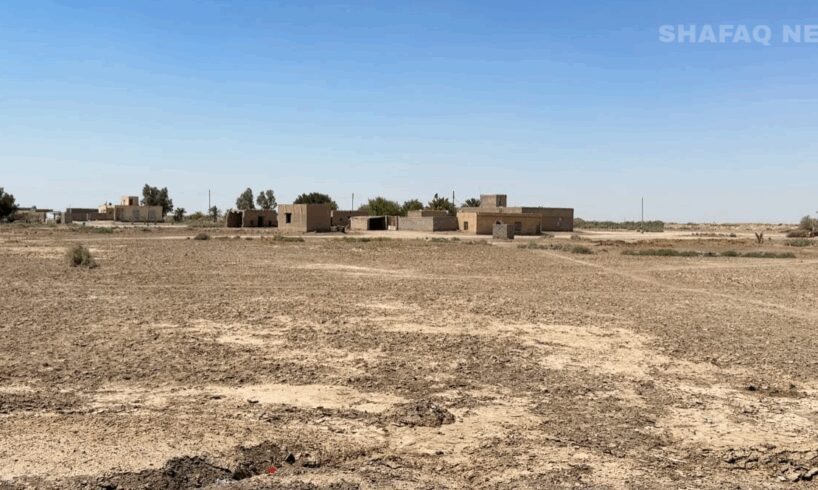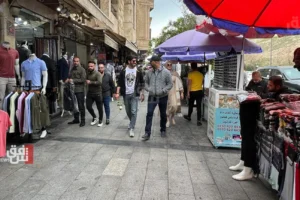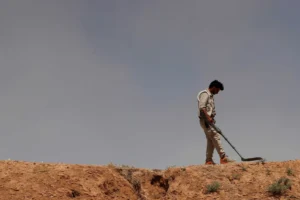
2025-09-22T09:56:03+00:00
font
Enable Reading Mode
A-
A
A+
Shafaq
News
Its
name is “Abeidha,” meaning “white,” yet for decades it has stood as one of
Iraq’s darkest havens for gang leaders, fugitives, and organized crime
networks.
Located
in the Sayyed Dakhil district east of Dhi Qar, the area long defied state
control. Geography, tribal dominance, and marshland terrain combined to create
a natural fortress where security forces rarely ventured.
After
years on the margins, Abeidha has returned to the security spotlight in recent
months. Sweeping military operations in neighboring Maysan targeting fugitives
exposed the scale of criminal activity radiating from the area. Officials now
say Abeidha is again at the center of Iraq’s law enforcement challenges.
Stretching
for tens of kilometers, the settlement is home to one of the region’s major
tribes and borders Iraq’s shrinking marshes, now scarred by drought.
Residents
recall its history of defiance. “The former regime bombed Abeidha with
warplanes after its security forces failed to storm it, discovering resistance
hideouts inside,” Abu Ali, a local man, told Shafaq News. “In later years, it
became a shelter for dozens of Iraq’s most wanted fugitives.”
What
once served as a stronghold for insurgents morphed into a sanctuary for
carjackers and highway bandits in the late Saddam-era. Figures like “Sab‘
al-Layl,” “Sab‘ al-Nahr,” “Ibn Shuwaia,” and “al-Aswad” became notorious for
hijacking vehicles and concealing them deep in Abeidha.
The
fall of Saddam’s regime only deepened its lawless reputation. When Baghdad
launched Operation Law Enforcement in Maysan years later, dozens of fugitives
sought safety in Abeidha. Security officials estimate that as many as 200
wanted men from Dhi Qar, Basra, and Maysan ultimately took refuge there.
Recent
attempts to reassert state control have faltered. “The forces were met with
three hours of armed resistance,” a security source told Shafaq News,
describing the most recent failed raid.
The
operation was linked to the kidnapping of a police officer in Souq al-Shuyoukh.
He was transferred to Abeidha to be hidden, the source explained. Negotiations
later secured his release, but only after authorities agreed to halt their
advance — an “unavoidable compromise,” as one officer described it.
Investigations
by Shafaq News reveal that many fugitives in Abeidha enjoy the protection of
political figures with senior government posts and armed wings. These networks
reportedly deploy them when needed — to eliminate rivals, sow instability, or
stage crimes for political leverage.
Convicts
sentenced in absentia also live openly in Abeidha, shielded from arrest. Its
strategic connection to the marshes along the Iranian border has turned the
area into a key corridor for smuggling, particularly narcotics.
The
latest security operation in Maysan, involving multiple branches of Iraq’s
armed forces, was launched after a sharp rise in violence, said provincial
council member Hussein al-Maryani.
“The
operation has significantly reduced crime inside Maysan,” al-Maryani told
Shafaq News, praising the forces’ efforts. Still, intelligence sources confirm
that several fugitives escaped, with specialized units now pursuing them.
For
decades, Abeidha has symbolized Iraq’s struggle to impose order in its southern
provinces: first an insurgent refuge, later a gangster sanctuary, and now a
smuggling gateway shielded by political protection. Despite repeated raids, it
remains — in the words of one officer — “a capital of crime” the state has yet
to reclaim.
Written
and edited by Shafaq News staff.





